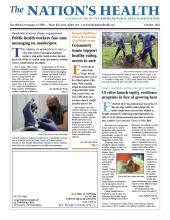
JEDI principles help people build equitable climate resilience into local planning.
Photo courtesy FG Trade, iStockphoto
As public health professionals work to build climate resilience, they are keeping justice, diversity, equity and inclusion in mind.
Earlier this year, APHA, in partnership with the Centers for Disease Control and Prevention, released a new playbook to help public health agencies embed those four principles — also known as JEDI — into their climate readiness and resilience plans. The goal is to ensure such plans reach and engage those most vulnerable and with the fewest resources to prepare for and recover from climate-related threats.
Research has shown that the most severe climate change hazards fall disproportionately on underserved communities, with communities of color particularly vulnerable.
“JEDI is an important tool because while climate change can affect anyone, not everyone is equally at risk,” said Evelyn Maldonado, program associate in APHA’s Center for Climate, Health and Equity. “We need to make sure we’re developing climate adaptation plans in partnership with those most affected. That’s the only way to achieve plans with an equity lens.”
The playbook was specifically designed to complement CDC’s Building Resilience Against Climate Effects framework, which aids local health officials in readying their communities for climate change. The APHA playbook offers a practical, step-by-step guide for integrating the BRACE and JEDI frameworks.
Many agencies have long been working to center equity in their climate activities. For example, the San Francisco Department of Public Health released a climate and adaptation framework in 2017 that listed equity as one of its top guiding principles. In Oregon, officials released a Climate Equity Blueprint in 2021 to help state agencies “center equity at the forefront of their climate adaptation work, not as an afterthought.”
“We use JEDI principles as both our lens and compass,” Alyssa McClean, MPH, climate and health program coordinator at the Oregon Health Authority, told The Nation’s Health.
A recent example is investing in community-based organizations — trusted entities already embedded locally — to boost climate resiliency among vulnerable residents. With the help of a community advisory council, the state health agency funded about 30 such organizations starting last year to do climate-related work, from tree planting projects to creating environmental justice curricula for urban youth to forums where leaders from communities of color can collaborate on climate action.
“If we don’t apply JEDI principles, the people in our communities with the fewest resources to protect themselves from the increasing severity and frequency of climate events will continue to suffer the consequences,” McClean said.
While the new APHA playbook was created to help users easily couple it with CDC’s BRACE framework, Maldonado said any agency can use it to help navigate the climate adaptation process in a more equitable way.
“We need to ensure all voices are included,” she said. “That’s at the core of it all.”
To learn more about the “Climate Change and Health Playbook: Adaptation Planning for Justice, Equity, Diversity and Inclusion,” visit www.apha.org/climate.
- Copyright The Nation’s Health, American Public Health Association









